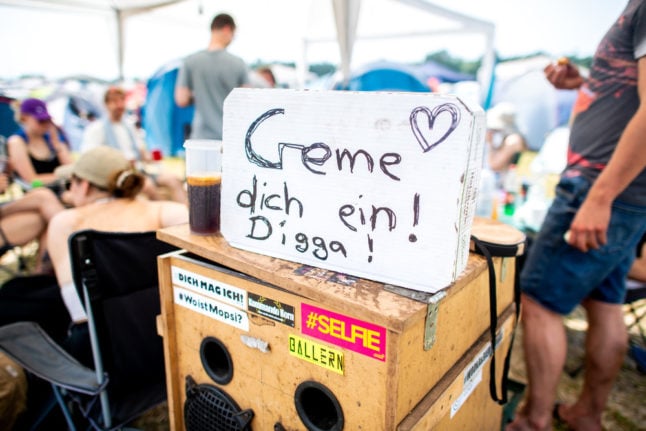REVEALED: This year's top 10 German 'youth words' and what they mean

Once again stuffed with English terms adapted into German, the Langenscheidt publishing house released its annual list of the top 10 German youth words on Wednesday. But what do they mean - and how do the cool kids use them?
A mix of both long-standing slang terms and freshly-minted Denglisch, the list forms the basis for an annual competition that aims to crown one “Jugendwort des Jahres” (youth word of the year).
READ ALSO: Denglisch: The English words which will make you sound German
Until September 20th, anyone can cast their vote for the top ten words on the website jugendwort.de, Langenscheidt announced Wednesday.
However, only the votes of participants between the ages of 10 and 20 will be considered for the competition, which will announce a final winner on October 22nd.
Langenscheidt has been publishing the Youth Word of the Year since 2008 - at that time, the winner was the very flattering word "Gammelfleischparty" (rotting meat party, or any celebration attended by people aged 30 and older).
Much hyped in the German media each year, the competition has also been criticised in the past as simply being an advertising campaign by the publisher.
So what are the top words?
Auf Lock: A shorter form of „Auf locker angelehnt“ oder „locker gemacht“, his means to take on things in a more relaxed (or locker) manner.
Darf er so?: An abbreviation for “Darf er das einfach so sagen?” (Can he actually say that?), the term expresses astonishment that someone had the nerve to say something. It’s usually negative, indignantly expressing disappointment at a hurtful joke or statement.
Digga(h): Hardly a new term, this dates back to Hamburg in the late 1960s. Stemming from Dicker, or fat man, it’s really just a term for bro or mate. It became popular among the young'uns in the ‘90s when it was popularised in the Deutschrap scene, and sounded like digga when quickly rapped.
READ ALSO: German word of the day: Digga

A sign at the Hurricane summer festival in Scheeßel, Lower Saxony in 2022 tells visitors, "Put on sunscreen! Dude!" Photo: picture alliance/dpa | Hauke-Christian Dittrich
goofy: Taken from American English, this word doesn't quite have a direct translation in German, with albern coming closest. This Jugendwort, in addition to meaning silly, is also a way to describe a person who acts awkward or clumsy - but, like in English, in a way that makes people laugh along with them.
Kerl*in: There are countless translations for this word, which basically just means guy. In British English, you might say block, chap or lad, or simply dude in American English. It’s also possible to say the feminine form, Kerlin, but it’s far less common.
NPC: An abbreviation for non-playable character, this term has been around in English for as long as video games, and refers to any character who, as the name suggests, can’t be controlled by the player of the game. But when this term is used in German it means, in a pretty derogatory fashion, that a person does not play a central role and is easily forgotten. Ouch.
Rizz: If someone has this quality, they can easily charm or win over other people. If that simply sounds like “charisma”, it’s because it was indeed taken directly from the middle of the English word.
Side-eye: This word may sound to older folks like it’s referring to an unusual birth defect (or what fish have). But the Jugend use it to refer to a distainful look you give another person when they say something you either find repulsive or strange.
Slay: No, the Jugend of Germany aren't thinking of Buffy the Vampire Slayer when they throw out this term. Rather the term, popularised on TikTok and Instagram and the like, is an expression for anyone who makes an impression, “slaying” you with their actions or appearance.
YOLO: Already the Jugendwort winner of 2012, this English-language acronym has once again made the list. “You Only Live Once” has become the motto of anyone looking to use chances they have or take a risk.
READ ALSO: English YOLO voted top German youth word
Comments
See Also
A mix of both long-standing slang terms and freshly-minted Denglisch, the list forms the basis for an annual competition that aims to crown one “Jugendwort des Jahres” (youth word of the year).
READ ALSO: Denglisch: The English words which will make you sound German
Until September 20th, anyone can cast their vote for the top ten words on the website jugendwort.de, Langenscheidt announced Wednesday.
However, only the votes of participants between the ages of 10 and 20 will be considered for the competition, which will announce a final winner on October 22nd.
Langenscheidt has been publishing the Youth Word of the Year since 2008 - at that time, the winner was the very flattering word "Gammelfleischparty" (rotting meat party, or any celebration attended by people aged 30 and older).
Much hyped in the German media each year, the competition has also been criticised in the past as simply being an advertising campaign by the publisher.
So what are the top words?
Auf Lock: A shorter form of „Auf locker angelehnt“ oder „locker gemacht“, his means to take on things in a more relaxed (or locker) manner.
Darf er so?: An abbreviation for “Darf er das einfach so sagen?” (Can he actually say that?), the term expresses astonishment that someone had the nerve to say something. It’s usually negative, indignantly expressing disappointment at a hurtful joke or statement.
Digga(h): Hardly a new term, this dates back to Hamburg in the late 1960s. Stemming from Dicker, or fat man, it’s really just a term for bro or mate. It became popular among the young'uns in the ‘90s when it was popularised in the Deutschrap scene, and sounded like digga when quickly rapped.
READ ALSO: German word of the day: Digga

goofy: Taken from American English, this word doesn't quite have a direct translation in German, with albern coming closest. This Jugendwort, in addition to meaning silly, is also a way to describe a person who acts awkward or clumsy - but, like in English, in a way that makes people laugh along with them.
Kerl*in: There are countless translations for this word, which basically just means guy. In British English, you might say block, chap or lad, or simply dude in American English. It’s also possible to say the feminine form, Kerlin, but it’s far less common.
NPC: An abbreviation for non-playable character, this term has been around in English for as long as video games, and refers to any character who, as the name suggests, can’t be controlled by the player of the game. But when this term is used in German it means, in a pretty derogatory fashion, that a person does not play a central role and is easily forgotten. Ouch.
Rizz: If someone has this quality, they can easily charm or win over other people. If that simply sounds like “charisma”, it’s because it was indeed taken directly from the middle of the English word.
Side-eye: This word may sound to older folks like it’s referring to an unusual birth defect (or what fish have). But the Jugend use it to refer to a distainful look you give another person when they say something you either find repulsive or strange.
Slay: No, the Jugend of Germany aren't thinking of Buffy the Vampire Slayer when they throw out this term. Rather the term, popularised on TikTok and Instagram and the like, is an expression for anyone who makes an impression, “slaying” you with their actions or appearance.
YOLO: Already the Jugendwort winner of 2012, this English-language acronym has once again made the list. “You Only Live Once” has become the motto of anyone looking to use chances they have or take a risk.
READ ALSO: English YOLO voted top German youth word
Join the conversation in our comments section below. Share your own views and experience and if you have a question or suggestion for our journalists then email us at [email protected].
Please keep comments civil, constructive and on topic – and make sure to read our terms of use before getting involved.
Please log in here to leave a comment.